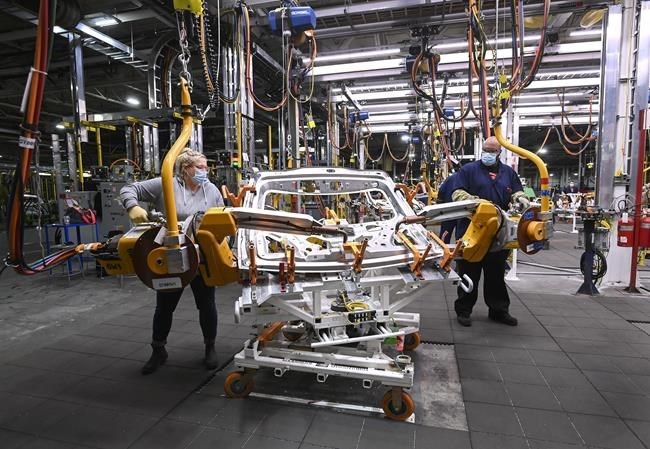Penny Wise became president of 3M Canada on Feb. 18, 2020, just as the COVID-19 virus was beginning to take hold in Canada. 3M had tackled health crises before, but like most Canadians, Wise had no idea how much the world was about to change.
Wise plunged into a logistics crash course as, the pandemic gained momentum and demand surged for 3M's Canadian-made cleaning products while the parent company began a global push to make two billion N95 respirators, tripling production in a single year.
Leading 3M Canada through the pandemic has taught Wise that the country needs to rethink supply-chain self-sufficiency for products such as personal protective equipment. Manufacturers such as 3M are hoping that the past year has convinced Canadian policy-makers, taxpayers and buyers to support local assembly lines after the pandemic exposed critical weakness in Canada's supply chains.
"I think there's a broader discussion to be had for manufacturers and businesses in Canada in general," says Wise, who is working on a new 3M plant in Brockville, Ont., to make N95 masks as Canadians rethink the trade-off between the variety and affordability of goods made overseas, and the importance of domestic manufacturing.
"One of the things I think that we need to change and look at from a Canadian point of view, is this idea of our industrial strategy. Canada is very much recognized as an international trading partner, and we are very engaged in that ...but what do we need in order to be self-sufficient as we move forward, so that we can protect our population during a crisis?"
Other manufacturers also scrambled to fill cracks in the supply chain exposed by COVID-19. At General Motors' plant in Oshawa, Ont., COVID-19 was yet another upheaval for a workforce still reeling from the plant's closure in late 2019 and subsequent reopening as a parts plant in the first quarter of 2020.
Ian Soutter, who helped set up GM's mask-making operation in Canada, said his spouse, a pharmacist, struggled to get a steady supply of protective equipment in the early days of lockdown.
"A year ago I was in a very different role. I was a plant guy and pivoting to electric vehicles," says Soutter. "There is not much about welding, painting or shooting screws into a truck that looks like this."
But GM found that much of the machinery and logic behind making a mask was the same as an auto part, and was able to produce about 10 million masks, at about one million per month. GM has a long history remaking its supply chain after events like the Fukushima Daiichi nuclear disaster in 2011, but COVID-19 presented new challenges, Soutter says. For instance, the raw materials to make masks were in extremely short supply, so GM reached out to its sources of acoustic insulation and asked them to pivot, too.
The pandemic also meant making hard choices for smaller manufacturers who saw their orders dry up last spring.
"I don't even want to say the number of hours per week (we've been working)," says Jamie Bakos of Titan Clean Energy Projects Corp. "It's not sustainable, but it is very busy."
Saskatchewan-based Titan repurposes materials headed for the landfill into products like soil enhancer or charcoal kitty litter. The company also makes biodegradable melt-blown fabric for use in PPE and air filters to help reduce the environmental burden of disposable PPE.
Molded Precision Components in Oro-Medonte, Ont., says it had about two months of cash on hand when orders for its automotive parts dropped to near-zero last March. The advanced manufacturing company sought grants to make protective equipment, moving 3D printers into engineers' homes and machinery into local fire halls and hockey arenas. On top of making face shields, the company devised a hand-sanitizer bottling system that was more efficient than purchasing the sanitizer ingredients from overseas.
While some of the auto business has now come back, the family business plans to stay in the medical supply industry and build a medical industrial park for other local suppliers.
Owner David Yeaman says Canadian companies can't just expect buyers to pay a made-in-Canada premium forever, or they risk the PPE supply chain slowly migrating back to cheaper goods made overseas. Instead, Yeaman says advanced manufacturing technology is needed to make a premium product that is competitive with outside bidders.
"We've got to think differently as Canadians," says Yeaman.
But entrepreneurs like Yeaman now face an uphill battle getting hospitals and other PPE purchasers to commit to contracts going forward, says Next Generation Manufacturing Canada, which gave Yeaman's company a grant. Many corporate PPE buyers have rigid requirements, like certifications that are done in U.S. labs which have been closed during the pandemic, says NGen chief executive Jayson Myers.
Myers is hoping that COVID-19 prompts buyers of PPE to rethink their mandates to buy specific overseas products and test new Canadian-made alternatives.
"We've already seen a number of companies that are laying off their employees and shutting down the production of PPE that they've set up, simply because...they can't get them on the market. In fact, some of them found better markets outside of Canada," says Myers.
"Some of these problems existed way before COVID. But the fact that we have these structural problems has become very apparent — the major one is around the procurement system itself."
This report by The Canadian Press was first published March 20, 2021.
Anita Balakrishnan, The Canadian Press



